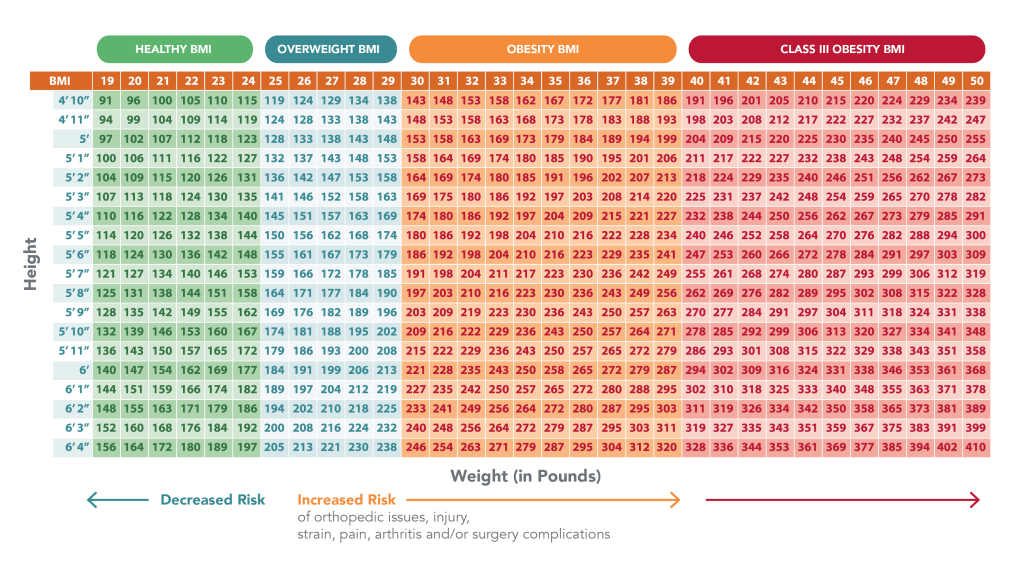Half the U.S adult population will have obesity within the next decade. For many orthopedic physicians, however, this is already a reality in their practice.1 As many as 55% of patients presenting to orthopedics replacement are obese, creating a crisis of Orthobesity™.2 Orthopods can intervene in this crisis if they prescribe weight loss to their patients.
Obesity is a risk factor for MSK issues
There is strong evidence that obesity is a risk factor for musculoskeletal (MSK) disorder and surgery complications, including:
- 20 times the likelihood of needing a knee replacement compared to non-overweight individuals.3
- 15% greater chance of MSK injury for overweight individuals and 48% greater for individuals with Class III obesity.4
- Significantly increased risk of wound infection, pulmonary complications, deep vein thrombosis (DVT), pulmonary embolism (PE), myocardial infarction (MI) and other complications following orthopedic surgery.5
Likewise, even moderate amounts of weight loss can greatly improve patients’ MSK health. Additionally, their odds of successfully recovering from surgery increase as well. Just one pound of weight loss, for example, relieves 4 pounds of pressure on the knee. This can greatly reduce stress on the joints and subsequent symptoms of pain.6
“…the preventative benefits of weight loss illustrate the importance of targeting all of your obese orthopedic patients with a prescription for weight loss. Not just those who need to lose weight in preparation for surgery.”
Why Orthopedics?
Obesity and orthopedic issues are closely linked, an association Prescribe FIT describes as Orthobesity™. Given their proximity to the problem, orthopedic physicians are in an ideal position to help combat Orthobesity™ directly by prescribing weight loss to their patients.
In fact, orthopods can prescribe weight loss as a conservative treatment for MSK-related issues before surgical intervention. A 2021 study found that overweight and obese people who lost over 7.5% of their body weight (e.g., 15 pounds for a 200-pound individual) were less likely to require total knee replacement relative to those who lost no weight or gained weight.7
Weight loss is also a top treatment recommendation of the American Academy of Orthopedic Surgeons (AAOS) for knee osteoarthritis.8 Given the importance of losing excess weight to improve pain, function, and surgery outcomes, orthopedists are responsible to inform their patients about the benefits of weight loss to their MSK and overall health.
Lastly, the preventative effects of weight loss can benefit any orthopedic patient with obesity. Likewise, it’s important to target all qualifying patients and not just those who need to lose weight in preparation for surgery.

What about primary care?
Obesity is linked to over 60 chronic conditions.9 Orthopedists can fill a critical gap in their patients’ healthcare by offering weight counseling specific to their MSK health. Although patients may receive weight counseling from a primary care provider, orthopedic physicians are better equipped to educate patients on the benefits of weight loss particularly regarding their MSK health.
Additionally, the more information channels patients have, the more comprehensive their understanding of the benefits of weight loss. Orthopedists can even lead the fight against Orthobesity™ by offering a weight loss program as an extension of their practice, discussed in more detail below.
Not only will patients benefit from a weight loss prescription, but orthopedic practice can benefit as well. First, there are several BMI care CPT codes that providers can bill for reimbursement.10 Second, physicians eligible for a Merit-Based Incentive Payment System (MIPS) can receive payment bonuses for providing BMI care.11
How to Prescribe Weight Loss
It’s important to note that it often isn’t enough to simply offer generic advice and hope that your patients listen. In reality, patients fare much better when providers offer their patients specific advice and check in regularly on their progress. To illustrate, one study found that patients lost an average of 7 pounds more when their provider offered specific advice to engage in a weight loss program compared to patients who only received generic advice to “lose weight” or “exercise more.”12
With the rise in popularity of remote patient monitoring (RPM), orthopedists can readily prescribe a weight loss program to their patients without excessive up-front costs or disruption to their current workflows. For example, Prescribe FIT is a full-service remote patient monitoring and lifestyle health solution that helps patients lose weight with simple changes to nutrition, physical activity, and lifestyle. Learn more about us at https://www.prescribefit.com/.
Published on October 17, 2022

